- Learning time
- 40 minutes
- First play time
- 100 minutes
Brian Boru: High King of Ireland
Designed by: Peer Sylvester
Brian Boru is a unique game in that it takes a classic board game trope of fighting for area control and marries it to a classic card game mechanic of trick-taking, as seen in classic card games such as whist: one player leads X suit, other players must follow suit if they can… Or not! In Brian Boru, players don’t have to follow suit, although not doing so means they won’t win the trick. But quite often, you won’t want to win the trick, as there are rewards for losing!
The setting is 10th century Ireland, and players are striving to be the dominant ruler. Over x number of rounds (-how many depends on the number of players) a number of tricks are played, with the winner in each case taking control of a town, and most-towns in a particular county leading to potential bonus points for controlling the region itself. Players are dealt six cards and play five tricks: the starting player chooses a town on the map and must play a matching-coloured card of red, blue and yellow (greys are wild and always considered on-suit). Winning a trick means you take control of the town, but bear in mind there are different ways to win: higher cards may also mean you pay money (or points) to take control, whereas winning a trick with a lower value card is more rewarding: there may be money for you instead.
But as previously noted losing a trick doesn’t mean your involvement ends. All ‘losing’ players get a kind of secondary reward, of gold, perhaps expanding on the map if they can afford it (most cards allow you to take control of a town adjacent to one you control, but at a cost of 5 gold) or contributing to three areas of interest in Boru’s realm: the church, defending the isle against viking invaders, and marriage to wealthy families that consolidate power in the realm. Being the player who has contributed most to these aspects of Ireland at the end of each round brings rewards; points, money, renown tokens (which score points over every round) and the prospective suitor available to wed, each of whom brings some plump dowry to the lucky guy or gal who hitches up with them. In every case, whilst the winners of church/vikings/marriage reset to zero for subsequent rounds, everyone else retains their current progress: meaning they start off stronger in the following round. Note however that the player contributing the least to defence against vikings will lose one of their towns to viking control (picked by the player who contributed most) meaning that although there is a seam of co-operation in seeing off the coastal predators, it’s also seamed with some fairly combative jostling.
The final hand available for marriage is always Estrid, who represents Brian and the vikings coming to an understanding of sorts: whoever wins her hand can gain control of the viking-claimed towns either to help claim majorities in the various counties, or to represent the spread of their influence: points are scored not just for the control of counties (and renown) but also how many counties you actually have a presence of any kind in. The player with the most points is the winner!
The guru's verdict
-
Take That!
Take That!
Although each trick is a battle of sorts, the nature of the game means losing out is never a complete wash-out.
-
Fidget Factor!
Fidget Factor!
Once you know the game, extremely low. Tricks are fast and cards run out quickly. There may be the odd short lull, but it's simpler than the rules make it seem and nobody should find themselves in paroxysms of indecision.
-
Brain Burn!
Brain Burn!
The map is the main focus, and foregoing any interest in it in favour of the 'lesser' rewards won't bring you victory. Critical is managing the moments of when to win and when to lose.
-
Again Again!
Again Again!
The deal (and draft) of the cards ensures no two plays are the same. Marriage and viking invaders also have elements of randomness.

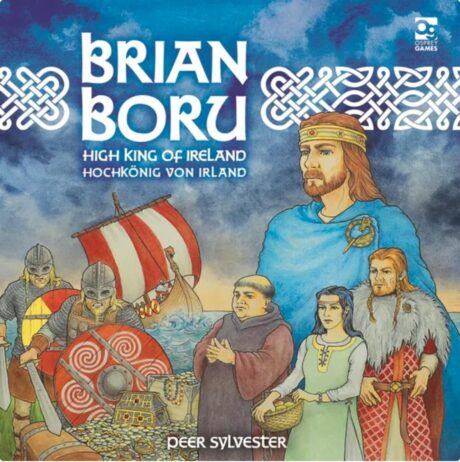
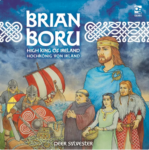
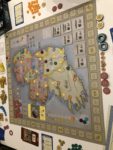
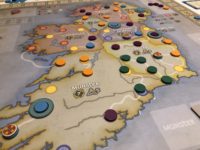

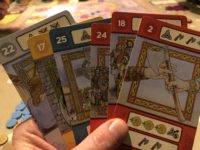
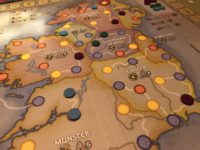


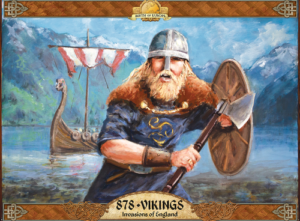
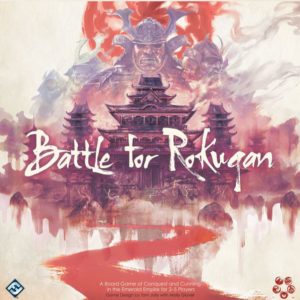

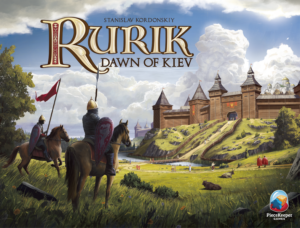

Sam says
It's not the easiest game to understand what everything means, and your first play may be a little stop-start as everyone comes to terms with exactly what does what, but the basic premise of control the map is easy enough, and the attendant 'consolations' of marriage, church and defending the realm do swim into focus after a couple of rounds. If Brian Boru isn't the most accessible game ever, though, it's worth persisting with because the way it's designed gives players strategic and tactical agency on the map, successfully using the tried-and-trusted mechanic of trick-taking. As well as the mounting drama on the board, there are also surprises and minor twists of fate on the way: cash is hard to come by so losing a trick might be in your best interest - but you may find yourself winning it! For all it's apparent opacity on first glance, once Brian Boru is up and running it also plays surprisingly fast: just 20 tricks are played in a four-player game, and even less with fewer players. It's kind of odd, and kind of quirky, but pulls off its bravado tricks with gusto.